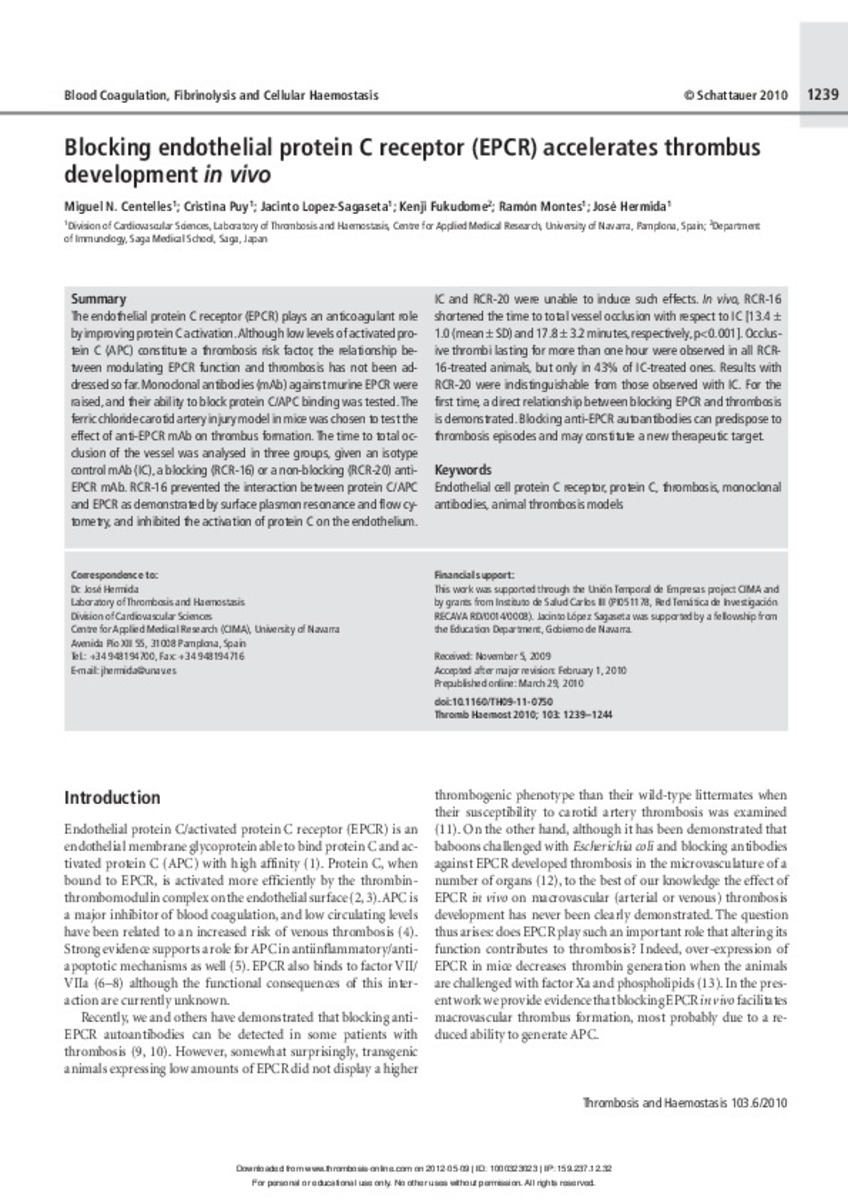Full metadata record
| DC Field | Value | Language |
|---|---|---|
| dc.creator | Centelles, M.N. (Miguel N.) | - |
| dc.creator | Puy, C. (Cristina) | - |
| dc.creator | Lopez-Sagaseta, J. (Jacinto) | - |
| dc.creator | Fukudome, K. (Kenji) | - |
| dc.creator | Montes, R. (Ramón) | - |
| dc.creator | Hermida, J. (José) | - |
| dc.date.accessioned | 2012-05-09T13:04:51Z | - |
| dc.date.available | 2012-05-09T13:04:51Z | - |
| dc.date.issued | 2010 | - |
| dc.identifier.citation | Centelles MN, Puy C, Lopez-Sagaseta J, Fukudome K, Montes R, Hermida J. Blocking endothelial protein C receptor (EPCR) accelerates thrombus development in vivo. Thromb Haemost 2010 Jun;103(6):1239-1244. | es_ES |
| dc.identifier.issn | 0340-6245 | - |
| dc.identifier.uri | https://hdl.handle.net/10171/21980 | - |
| dc.description.abstract | The endothelial protein C receptor (EPCR) plays an anticoagulant role by improving protein C activation. Although low levels of activated protein C (APC) constitute a thrombosis risk factor, the relationship between modulating EPCR function and thrombosis has not been addressed so far. Monoclonal antibodies (mAb) against murine EPCR were raised, and their ability to block protein C/APC binding was tested. The ferric chloride carotid artery injury model in mice was chosen to test the effect of anti-EPCR mAb on thrombus formation. The time to total occlusion of the vessel was analysed in three groups, given an isotype control mAb (IC), a blocking (RCR-16) or a non-blocking (RCR-20) anti-EPCR mAb. RCR-16 prevented the interaction between protein C/APC and EPCR as demonstrated by surface plasmon resonance and flow cytometry, and inhibited the activation of protein C on the endothelium. IC and RCR-20 were unable to induce such effects. In vivo , RCR-16 shortened the time to total vessel occlusion with respect to IC [13.4 +/- 1.0 (mean +/- SD) and 17.8 +/- 3.2 minutes, respectively, p<0.001]. Occlusive thrombi lasting for more than one hour were observed in all RCR-16-treated animals, but only in 43% of IC-treated ones. Results with RCR-20 were indistinguishable from those observed with IC. For the first time, a direct relationship between blocking EPCR and thrombosis is demonstrated. Blocking anti-EPCR autoantibodies can predispose to thrombosis episodes and may constitute a new therapeutic target. | es_ES |
| dc.language.iso | eng | es_ES |
| dc.publisher | Schattauer | es_ES |
| dc.rights | info:eu-repo/semantics/openAccess | es_ES |
| dc.subject | Endothelial cell protein C receptor | es_ES |
| dc.subject | Protein C | es_ES |
| dc.subject | Thrombosi | es_ES |
| dc.subject | Monoclonal antibodies | es_ES |
| dc.subject | Animal thrombosis models | es_ES |
| dc.title | Blocking endothelial protein C receptor (EPCR) accelerates thrombus development in vivo | es_ES |
| dc.type | info:eu-repo/semantics/article | es_ES |
| dc.relation.publisherversion | http://bit.ly/IKxT1D | es_ES |
| dc.type.driver | info:eu-repo/semantics/article | es_ES |
Files in This Item:
Statistics and impact
Items in Dadun are protected by copyright, with all rights reserved, unless otherwise indicated.






